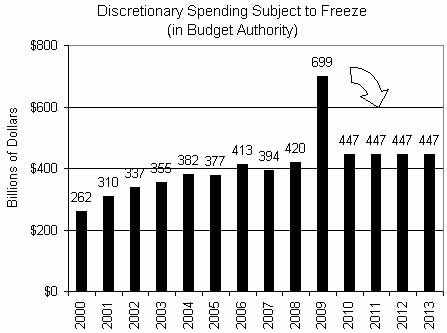German automotive industry at a crossroads
Kategoria: Business
Przed dzisiejszym, jednym z najważniejszych przemówień prezydenta USA w czasie jego kadencji, State of the Union, rozgorzała debata na temat cięcia wydatków budżetowych. Cato blog twierdzi, że prezydent zamierza zamrozić wydatki na 3 lata. Zwłaszcza na obronę, bezpieczeństwo i weteranów wojennych. Od 201o do 2013 r. wydatki budżetowe mają nie przekroczyć 447 mld USD.

Cato powątpiewa jednak w zapowiedzi oszczędności. Bo ten projekt wygląda bardzo konserwatywnie, gdyby nie fakt, że administracja ma do dyspozycji 82 proc. środków finansowych z pakietu stymulacyjnego (tylko 18 proc. zostanie wydanych w roku budżetowym 2009).
Finally, a president’s proposals for discretionary spending beyond the current budget year are meaningless. Obama will be back with a new budget in February 2011, no doubt with a whole new set of assumptions and priorities.
Economist blog interpretuje plan oszczędnościowy jako porażkę programu gospodarczego prezydenta USA. Dr Mike Konczal z Rorty blog jako memento przypomina podobne posunięcie z 1938 r. Wówczas program zaciskania pasa Franklino D. Roosevelta doprowadził do drugiego tąpnięcia w gospodarce. A odredakcyjny komentarz tygodnika New Republic ostro krytykował prezydenta: ….Taxes during your administrations have on the whole been amazingly light…Your very mild efforts to regularize Wall Street, to make the electric utilities behave, to obtain recognition of union labor, have been matters on which most sensible men have agreed with you. They have been directed chiefly against the small minority of bandits whom the majority has always wanted to discipline if it could. Konczal uważa, że komentarz nie stracił na aktulności, jedynie „electric utilities” trzeba zastąpić „przemysłem ubezpieczeń zdrowotnych”.
Jednak najostrzej o zamrożeniu wydatków wyrażają się ci ekonomiści, którzy sekundują administracji Obamy. Paul Krugman pisze wręcz, że Obama sam siebie likwiduje.
It’s bad long-run fiscal policy, shifting attention away from the essential need to reform health care and focusing on small change instead.
And it’s a betrayal of everything Obama’s supporters thought they were working for.
Brad DeLong złagodził swoją krytykę. Ale także nie szczędził batów administracji
this is a perfect example of the fundamental unseriousness of Barack Obama and his administration: rather than make proposals that will actually tackle the long-term deficit in a serious way– either through future tax increases triggered by excessive deficits or through future entitlement spending caps triggered by excessive deficits– he comes up with a proposal that does short-term harm to the economy as an alternative to tackling the deficit in any serious and significant way.
Prof. James Kwak z Baseline Scenario obawia się, że administracja imituje Billa Clintona, który jego zdaniem, tylko udawał, iż przeprowadza reformy.
Deficit reduction is a classic “Third Way” policy, but by doing it this way Obama is ceding ground to the government-haters (who just want to cut spending) without getting anything (future tax increases, or votes for health care reform) in return.



